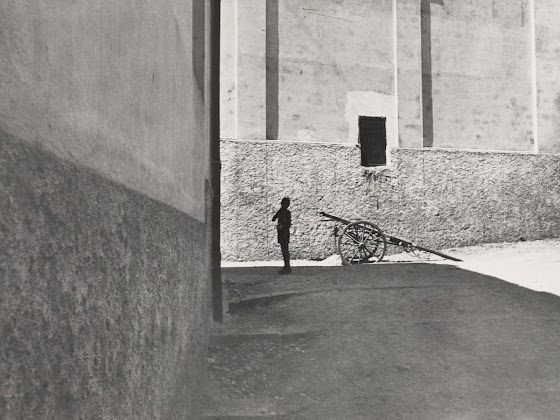Call me unrealistic but I have never liked ‘effects’, as in 'slick painting effects' or excessive 'photoshop effects'. From Texas style vulgarity to Madison Avenue Advertising, to music, art, or ubiquitously with photography, whose use of so many 'after-effects' and 'highlighting' with programs (like the previously mentioned Photoshop) or Lightroom where photos seem almost downright pornographic, which is to say, way too much information.
The following images by Henri Cartier Bresson reveal a land rich with pictorial relationships unified by the light of the natural world. And because of that, these images possess an almost magical verity created as if by some mysterious godly muse, but in fact, they are really just the result of a craft in the hands of a master.
But, it’s in the world of Painting where I find this random and artificial use of lighting so grotesque for it becomes a barrier into a world of the sublime. And this isn't a new thing in the history of Painting, it’s been around for centuries because it relies upon the general public's insatiable desire for artifice and a perceived technical prowess. This is the real problem. There is nothing wrong with a competent technique obviously but when that is all there is on the menu it makes for a poor meal.
To be fair, few people in any period have understand what really great Painting is all about (which has everything to do with natural light). And this immediately reminds me of Baudelaire's remark when he said (and I paraphrase) that upon viewing a great work of art it almost always appears UGLY at first sight. And aside from a very small and select group of rich intellectuals, if there is anything we know about the public, they are habitually adverse to what is conventionally considered UGLY. One only has to think of poor Vincent Van Gogh. Considered crazy and without any discernible talent he received ZERO interest from a general public made up of a bored and conventional Grande Bourgeoisie. Only a small coterie of artists and writers among a few artistically switched-on luminaries understood his natural genius. Even Cézanne, who was thought to be a crude painter himself and vilified in his native Aix, thought Vincent was nuts, "le fou d'Arles", he wrote to Emile Bernard who knew both painters.
So the question of technique (perceived and otherwise) has always been a problem in the creative world. And so much of today's artistic world has been taken over by Social Media for good or ill that it seems to be changed forever. I fear that it has infected the general public's aesthetic sensibilities for the worse. But the grandfather of all, for good and ill, is the evolution of Technology in the Arts.
Because today we rely upon machines to do so very much for us, it also naturally opens up fractures in the foundation of our artistic sensibilities. We judge everything so differently now, through different lenses, different cultures, and disparate ideas of aesthetics, and yet, is there not a thread of something which can bind us all?
Are we (or have we already?) moved into a machine-made aesthetic of a new order? This would be terrible of course, but quite possibly it has already taken root in our limited senses. In the future will machines make music and paintings easier to fabricate in the same way they already do for sex and war? Will the sensibilities of a human being even be needed?
Technology has helped to create such great music yet so much of it now made by 'musicians' who have barely learned how to read music. No Worries! as they say! Hit the right buttons Bro! It's cool, kool as a kukumber my main man!
I suppose what really prompted this personal diatribe is that I hate that photography has been carjacked by the boring and conventional. Everyone, it seems, now uses something to "jazz up" their photos, and I think it's really a great shame just as I do in the Painting World where white paint is splattered around a canvas to confuse the viewer into believing it's light, the very essence of Painting.
Where is Henri Cartier-Bresson when we need him most?








No comments:
Post a Comment